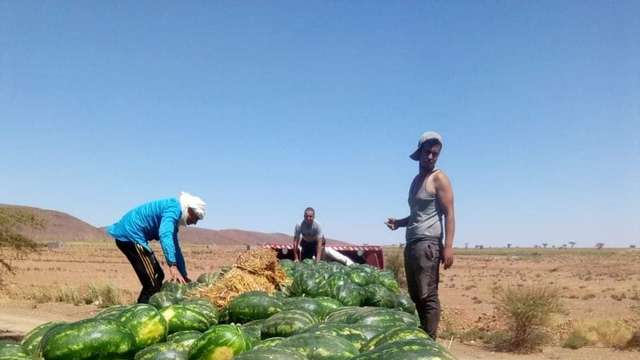Water poverty forces Morocco to restrict watermelon, avocado cultivation

In a bid to fight water scarcity, Morocco’s government passed a series of measures over the past two years restricting the cultivation of water-intensive crops.
On October 18, the Zagora province, a key producing region of watermelon in eastern Morocco, limited the cultivating area for watermelon crops to a maximum of one hectare.
The decision came a year after the government announced in September 2022 discontinuing irrigation subsidies on avocado and watermelon cultivation following demands from NGOs and experts.
Avocado crops consume a substantial amount of water such that one kilo or about five fruits requires up to 700 litres of water. Meanwhile, watermelon is made up of 99% of water.
The proliferation of small-scale unregulated farming practices exacerbated the trend. In April 2023, the Water and Logistics Minister, Nizar Baraka, revealed that 90% out of the 372,000 wells in Morocco are unauthorized. Given Morocco’s climate, which is characterized by unpredictable rainfall, farmers rely on groundwater they access by digging wells.
“We cannot continue to allow people to dig up wells in their fields at random,” economist Mohammed Jadir told The Global South World.
“Underground water reserves are over-exploited in addition to the unregulated exploitation of river water; over 1 million cubic meters of water is stolen every day from rivers,” he added.
Irrigation consumes around 80% of Morocco’s water annually, according to estimates, making it a primary factor in the water scarcity crisis.
Water scarcity is emerging as a significant challenge for the North African kingdom. The increased frequency of droughts has made Morocco a “climate hotspot” and one of the world’s “most water-stressed countries,” the World Bank maintains. The country is approaching the absolute annual threshold of 500 cubic meters of water per person by 2030.
Like many other experts, Jadiri pointed out that cultivating water-intensive crops is a threat to the country’s water security. “We can’t continue to export water to the European Union,” he stressed.

Small farmers bear the brunt of water scarcity policies
While government policies to preserve the dwindling water resources are applauded by environmentalists and economists, agriculture workers worry that only smallholder farmers are bearing the brunt of the climate policies.
Official data indicates that 70% of land used for agriculture is less than five hectares, reflecting that the vast majority of agriculture activities are carried out by smallholder farmers.
“Tightening the noose on the farming of watermelon and avocado is simply pushing big farmers to move their operations down to Mauritania where they found fertile soil and water,” a professional working in a produce export and import company in Agadir told Global South World.
“For smallholder farmers who gain only enough from selling crops to make a living, the new policies mean that licensing wells is getting harder, and they won’t have access to water,” he explained.
Since 2008, the government launched multiple programs to help farmers integrate irrigation grids to replace the use of unregulated wells and help them access funding to boost production, including a $12 billion seven-year roadmap in 2020 to increase water supply and regulate its use.
“Unlike commercial farmers, smallholders usually use unregulated wells, so when financing institutions ask for documents they can’t provide, they don’t get approved for a loan,” the agriculture professional added.
Severe droughts were already pushing many farmers to abandon the trade, which in turn affected market supply and raised the prices of produce in the local market, a 2022 report from the United Nations Office for the Coordination of Humanitarian Affairs (OCHA) warned.
Climate policies in Morocco are much needed as the country is already well below the international water poverty line of 1000 cubic meters per capita. However, unless government policies balance climate policies against effective support programs for smallholder farmers, water scarcity will aggravate poverty and potentially lead to food security issues.